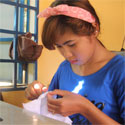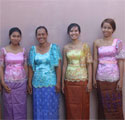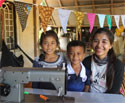 |
 |
 |
Project - Human Hope Sewing Program |
 |
|
Human Hope Sewing Program
www.humanandhopeassociation.org
Read the report on the project half way through the year and see how the students are doing.
And we got an update after graduation about the students who completed the program.
Here is where you can read about the successes.
 Human and Hope Association is a grassroots NGO based in Siem Reap, Cambodia and run by Khmer staff. Through projects focused on education, vocational training and community support, the aim is to empower Cambodians to create sustainable futures by breaking the cycle of poverty.
Human and Hope Association is a grassroots NGO based in Siem Reap, Cambodia and run by Khmer staff. Through projects focused on education, vocational training and community support, the aim is to empower Cambodians to create sustainable futures by breaking the cycle of poverty.
The sewing program trains marginalized women in sewing, business and life skills over the course of 10 months. With their skill, they either set up businesses at their homes, work for sewing shops or make products for the organization.
 Students study for three hours a day, five days a week. Over the course of ten months they learn everything from how to use a sewing machine to designing and sewing traditional ceremony tops. Every Friday life-skills training is provided to the students, with topics attempting to address issues identified in the community such as anger management, child protection, goal setting, financial management, domestic violence and family planning. These lessons equip students with new knowledge and also increase their confidence in dealing with these issues as they arise. There are additional one-off workshops, such as business skills and job interview skills.
Students study for three hours a day, five days a week. Over the course of ten months they learn everything from how to use a sewing machine to designing and sewing traditional ceremony tops. Every Friday life-skills training is provided to the students, with topics attempting to address issues identified in the community such as anger management, child protection, goal setting, financial management, domestic violence and family planning. These lessons equip students with new knowledge and also increase their confidence in dealing with these issues as they arise. There are additional one-off workshops, such as business skills and job interview skills.
After studying in the program for three months students have the opportunity to take out a
microfinance loan. This is used to purchase a machine to practice their lessons at home and begin
fixing and making clothes for their neighbours. They begin repayments 6 months after first receiving
the machine so they can feel confident in their ability and are not pressured to pay back their loans straight away.
The goal is for sewing students to be making a minimum of $60USD/month profit within one year of
graduating from the program, and a minimum of $90USD/month profit within three years of graduating from the program. This enables them to support their families, particularly the education of their children so that they have better opportunities for their futures.
 33 students have completed the entire sewing course to date. Before they started sewing, most were earning $40 - $60 a month by growing vegetables or working as construction builders. Some also were housewives and relied on their husbands or parental income. After attending the program, 75% of students used the sewing skill to earn an income, this percentage from the very onset of the sewing program. Tweaks are constantly being made to improve both intake and success rates. Now that the sewing program has been developed, all the graduates from the past year earn an income with the knowledge of sewing they have acquired and the expectation is that all the students going forward will also use their skill achieved during the program. 30 sewing machines have been purchased through microfinance loans for students to set up their own businesses, nine staff members have been able to pursue further education through scholarship programs, community workshops have been run for hundreds of villagers and there has been the set up handicraft businesses to earn an income for the school.
33 students have completed the entire sewing course to date. Before they started sewing, most were earning $40 - $60 a month by growing vegetables or working as construction builders. Some also were housewives and relied on their husbands or parental income. After attending the program, 75% of students used the sewing skill to earn an income, this percentage from the very onset of the sewing program. Tweaks are constantly being made to improve both intake and success rates. Now that the sewing program has been developed, all the graduates from the past year earn an income with the knowledge of sewing they have acquired and the expectation is that all the students going forward will also use their skill achieved during the program. 30 sewing machines have been purchased through microfinance loans for students to set up their own businesses, nine staff members have been able to pursue further education through scholarship programs, community workshops have been run for hundreds of villagers and there has been the set up handicraft businesses to earn an income for the school.
Of the sewing graduates who use their skills, 15% work at sewing shops in town, earning $100 - $120 per month. The other 85% set up sewing shops at their homes, or were hired to be our seamstresses. They earn between $40 and $100 a month (plus have other sources of income) through making or fixing clothes for their neighbors and making clothes for factories, shops or hotels. By working at home they have time to undertake housework and take care of their children and farms. Every single student has increased their confidence and self-esteem from the program.
Follow up is done monthly for a year after graduating. There are refresher training courses once a month for five months after graduating to continue to build confidence. They are surveyed once a year after graduation to compare their standard of living and provide ongoing support by announcing job opportunities which can be taken advantage of.
|
|
|